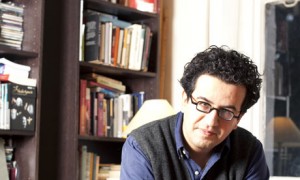Hisham Matar: The Politics of Oedipal Fears
I chanced upon Hisham Matar as an implied reader of Borges. An implied reader, as Wolfgang Iser defines, is the real reader that a literary work requires, whom the author expects and who meets the expectations of the work. When Hisham reads Borges’ ‘short story’ Shakespeare’s Memory for the New Yorker Fiction Podcast, I imagine Borges as being reborn and rereading the story. It’s like another domineering voice popping out and intruding in the narrative which happens in the context of that voice having been erased. In Hisham’s In the Country of Men, the narrator-protagonist is often guided by his doubts, hallucinations and, moreover, the surreal presence of people who disappeared. That is what Borges is doing while Hisham chooses the Argentine maestro’s story to read it for podcast.
Hisham says after reading the story out to us that serious literature is dangerous, as its very silence haunts us and alters the way we live after we read it. Read this comment in the context of In the Country of Men, where the reign of terror unleashed by the revolutionary committee men after Muammar Gaddafi captured power in Libya is being described in the form of a book the narrator’s father is reading. The book is ‘Democracy Now’, which the narrator’s mother asks him to burn, but which he hides under the bed. This happens during the first disappearance of Baba. (In Hisham Matar’s works we may rightly encounter the word disappearance as euphemism for ‘state-sponsored whisking away).
Baba comes back after the intervention of a benevolent neighbor who is in the civil service. His son gifts him with the book he saved from fire. His parents later send the narrator away to Cairo to start learning to live from there (to be exempt from endless restrictions from being a Libyan). Later through telephone calls, the narrator is informed that his father got whisked away for the same book again. After the Gaddafi government’s financial policies had hampered the smooth functioning of the family, his father had taken on a job, while translating Machiavelli in the spare time. He was not arrested for Machiavelli (No government would ever arrest anyone for translating Machiavelli), but for reading some passages from Democracy Now to a colleague.
Born in New York City in 1970 and brought up in Tripoli, Hisham Matar’s first book was In the Country of Men which is an autobiographical account of his father’s forced exile after being accused of being a reactionary to the revolutionary regime under Gaddafi. The novel is contrasted in the form of a surreal existence of a son and his mother after his father disappeared just like their reactionary neighbours. In 1990, while Hisham was doing his graduation in London, his father was kidnapped in Cairo. The event was brilliantly and poignantly sketched in the book ‘The Anatomy of a Disappearance’, where a young boy’s sexual fantasy and jealousy is jarringly juxtaposed with his father’s kidnapping as well as with the search of the boy along with his delectable young step mother for his whereabouts through the bureaucratic indifference . Both the novels carry the undercurrent of Oedipal angst which the absence of father both invigorates (as the absence gives space for fantasies and psychedelic imaginations) and enervates (Oedipal context brings itself to fore in the presence, not in the absence of, father).
The ambivalence of a young boy about the absence of his father is the root of the two novel’s political imaginations. The unsettling presence of the father creates the formation of tensions which lies at the very core of the subject’s identity. Oedipal unrest can’t exist but as a sum of these tensions. But the disappearance rather whisks away these tensions as well, thereby denying the subject its very identity. We are forced to imagine Gaddafi that way, too. The very formation of a rebellious political identity is imaginable in the presence of Gaddafi and of his muzzling, muscular and patriarchal autocracy. He disciplines us and subjects us to many a forced exile. But he disappeared, leaving the space for another autocratic regime to unsettle our calm way of being with the mother (which is metaphorically Libya). But experiencing such a political extension of oedipal fears is the necessary condition for living in a nation state (that has textures and shades of fascism and autocracy). Though Hisham juxtaposes, towards the end of In the Country of Men, India against Libya (in his imagination of freedom against oppression), that may not be actually the case in the long run.























Connect
Connect with us on the following social media platforms.